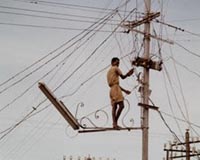 |
Atlanta, GA (SPX) Feb 22, 2010 Why are electric rates higher for customers of Cobb County, Georgia's electric membership corporation (EMC) than for other utility customers? That's only one of the questions Cobb and other EMC members hope to find answers to as the National Rural Electric Cooperative Association (NRECA) gathers in Atlanta this week for its annual meeting. America's electric co-ops were founded in the 1930s as member-owned utilities in rural areas where big utility companies were not serving the population. Today, 900 co-ops still provide power to 42 million Americans in 47 states, but often these associations look more like big private corporations than the democratically-managed cooperatives of earlier days. These days, co-op members are asking a host of questions about the governance and energy decisions of their co-ops, and what they are doing to move toward democratic transparency and encourage energy efficiency and clean alternative energy production. Some of the cooperatives represented at the conference, such as Texas' Pedernales Electric Cooperative (PEC), have had a change in direction and now aim to embrace 21st century energy planning by developing aggressive, cost-effective efficiency programs and integrating renewable energy into their generation portfolios. This mode of operation represents a seismic shift from Pedernales' previous approach. Board member Dr. Patrick Cox is excited about the co-op's transparency, democratic board elections and adherence to business planning. He addressed the NRECA conference to spotlight changes at PEC. "I believe advocacy for member rights, ethical leadership, environmental accountability and responsible investment has resultd in and will continue to provide positive changes in PEC's effectiveness and its relationship to its membership." Other electric cooperatives, such as Cobb Electric Membership Corp., are not as exemplary and remain mired in the past. "In my view, the challenge for our EMC is that questionable leadership has us headed in an unsustainable direction," said Tom Barksdale, chair of the Cobb Alliance for Smart Energy (CASE). Barksdale noted he wants to see Cobb EMC embrace more open practices, such as sharing finances and business plans with members. He would also like to see Cobb EMC move away from its fixation on expensive, outdated generation technologies, primarily coal-fired energy. Cobb EMC has had no board elections in two years. Its members cannot get access to data and sufficient rationale requested for resource decisions, such as plans to spend 2 billion dollars on a coal-fired power plant (or two) when this coop has never built or run one. The arrival in Atlanta of rural electric association board members from other co-ops across the country shines a spotlight on the opportunity to address the clean energy alternatives of the future, often due to the closed-door decision-making by powerful board members who have no interest in running a democratic nonprofit cooperative organization. The public electric association that stands out as a champion for democratic process and for successful implementation of cost effective renewable energy is Colorado's San Miguel Power Association (SMPA). Board leaders have worked to make SMPA a rural electric association that is a true American institution and a model of clearly articulated democratic principles that give members a voice at every board meeting. In Kentucky, Steve Wilkins, a ratepayer/member of Blue Grass Energy Cooperative, which is one of 16 co-ops that distribute power generated by East Kentucky Power Cooperative (EKPC), says that from what he can see "democracy has been lacking in EKPC where directors are almost universally handpicked by the co-ops and elected without opposition due to a lack of encouragement for open elections." Given that EKPC "is in a relatively weak financial position because of its large debt, members are baffled that financially safe energy investments such as energy efficiency and renewables are not being pursued instead of building a financially risky coal plant, which is what EKPC is currently committed to doing." In Colorado, Texas and New Mexico, member-owners of electric cooperatives have implemented changes to ensure open meetings, voting and election safeguards, and to guarantee other fundamental rights. Former Georgia Congressman Fletcher Thompson, a Cobb EMC member, believes that adopting a "bill of rights" for the co-op will help. Cobb EMC has been plagued by scandal as reported in media outlets in Georgia. "I am especially concerned that members lack sufficient access to records concerning their cooperative. Their rights need to be protected by law. We want our electric co-op to welcome input from members. We believe that sound business practices go hand-in-hand with sound energy investments."
Share This Article With Planet Earth
Related Links Georgians for Smart Energy (GSE)
 India: no electricity prompts fire ritual
India: no electricity prompts fire ritualNew Delhi (UPI) Feb 15, 2009 Villagers of Kanugaon in northeast India marked 25 years without electricity Sunday with a mock Hindu fire ritual to call attention to their life in darkness. Utility poles to light up the village were delivered in 1985, yet the residents of Kanugaon in the Assam state still have no access to electricity, CNN reports. "All our petitions with the authorities have gone in vain," sa ... read more |
|
| The content herein, unless otherwise known to be public domain, are Copyright 1995-2010 - SpaceDaily. AFP and UPI Wire Stories are copyright Agence France-Presse and United Press International. ESA Portal Reports are copyright European Space Agency. All NASA sourced material is public domain. Additional copyrights may apply in whole or part to other bona fide parties. Advertising does not imply endorsement,agreement or approval of any opinions, statements or information provided by SpaceDaily on any Web page published or hosted by SpaceDaily. Privacy Statement |